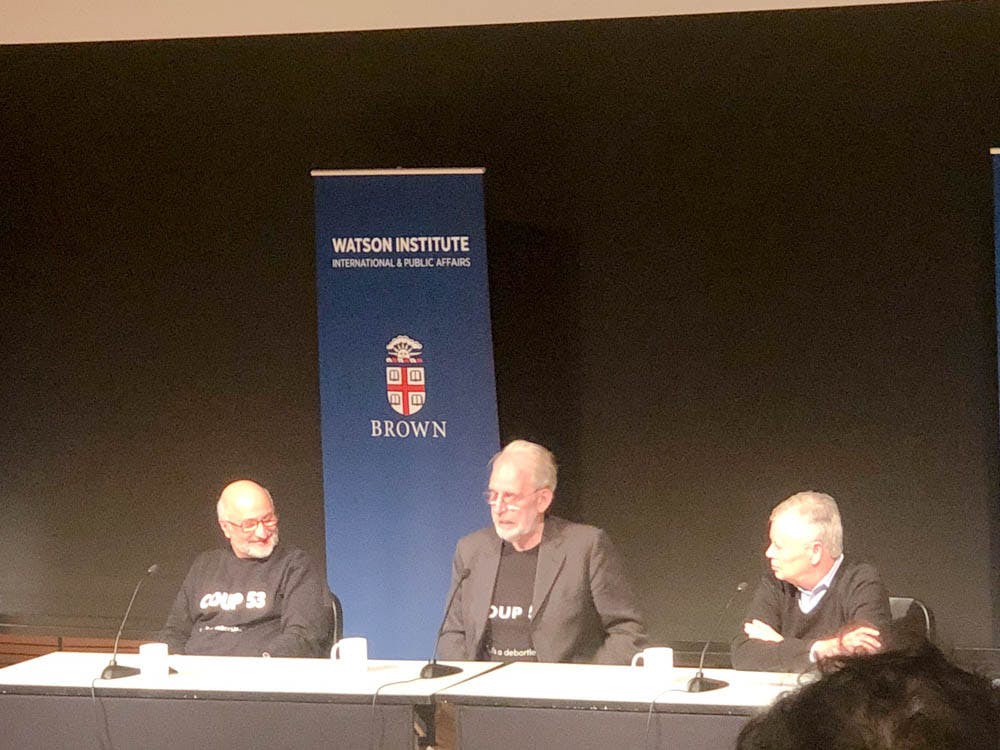The Watson Institute for International and Public Affairs kick-started the John F. Kennedy Jr. Initiative for Documentary Film and Social Progress with a screening of “Coup 53” at the Granoff Center for the Creative Arts Tuesday evening.
A documentary on the 1953 Anglo-American coup in Iran, “Coup 53” is “politically explosive and cinematically innovative,” according to the Watson Institute’s press release. The event began with a screening of the film, which was followed by a question-and-answer session with the film’s director, Iranian-born filmmaker Taghi Amirani, as well as its co-writer and editor Walter Murch, an Academy-Award winning and renowned film editor and sound designer. Stephen Kinzer, a senior fellow at the Watson Institute and an award-winning author and journalist, moderated the discussion.
Amirani was inspired to make a film after reading one of Kinzer’s books, “All the Shah’s Men: An American Coup and the Roots of Middle East Terror,” which details the coup of 1953. The coup, a CIA operation led by President Dwight D. Eisenhower and Prime Minister Winston Churchill, overthrew the democratically elected Iranian Prime Minister Mohammad Mossadegh to reinstate the last Shah of Iran, Mohammad Reza Pahlavi.
After initially planning to direct a feature film based on the book, Amirani decided to produce a documentary when he met with Mossadegh’s bodyguard during his research process. “I was blown away by his vivid memory, his eloquence and the fact that this was a man who was there. … Why would you want to do this with actors, (when) you have a real man here?”Amirani said. “Nobody is being stitched up in this film. Every single thing is exactly as they said it.”
Amirani discussed the evolution of the project beyond its original scope. “The original concept of the film as I understood it, and as Taghi understood it, was that we were going to tell a story of what happened on the four days of the coup,” said Murch, who previously worked on feature films such as “The Godfather” and “Apocalypse Now.” “In the end it turned out to be a much longer and bigger project than any of the team that worked on the film thought, for all kinds of reasons,” he added.
“I grew up with the story,” Amirani said, explaining how he lived under the fear of the Shah during his childhood in Iran from 1960 to 1975. The film documented Amirani’s process of discovering archives that unraveled the development of the coup. When questioned by Kinzer about his choice to frame the film “as kind of a detective story rather than (a simple presentation) of the material,” Amirani responded that it “wasn’t a decision, it’s something that organically grew out of the process.”
In “Coup 53,” the filmmakers present new evidence detailing the involvement of MI6 operative Norman Darbyshire in the coup — a revelation that Variety called “cinematically thrilling.”
“(When you) look at the panoply of events and characters, and as the steam built up in the story — particularly with the discovery of … Darbyshire’s involvement and the attempt to erase the history of that involvement — that’s where you begin to smell blood in the water which gets you excited as a storyteller,” Murch said.
Murch was provided with 532 hours of material, which he condensed to an hour and 59 minutes. He compared the editing process to “building a mosaic out of 532,000 chips of little stones.”
The film is part of the John F. Kennedy Jr. Initiative for Documentary Film and Social Progress, a project organized by the Watson Institute that aims to shed light on complex social issues through documentary screenings. Kathryn Dunkelman, director of communications and outreach at the Watson Institute, said that the initiative is dedicated to “honoring (John F. Kennedy Jr. ’83’s) legacy and his commitment to bringing news and narrative to a wider audience in creative ways.”
“Coup 53” was a “great fit with Watson considering it’s a historical look at the coup in Iran,” she added.
Correction: A previous version of this article stated that the coup was a "CIA operation led by President Franklin Roosevelt." In fact, the operation was led by President Dwight D. Eisenhower and U.K. Prime Minister Winston Churchill. A previous version of this article also stated that "Coup 53" was "based on one of Kinzer’s books." In fact, Amirani conducted his own research for the documentary. The article stated that Amirani "lived under the fear of Reza Shah," when in fact, he "lived under the fear of the Shah." The Herald regrets the errors.





